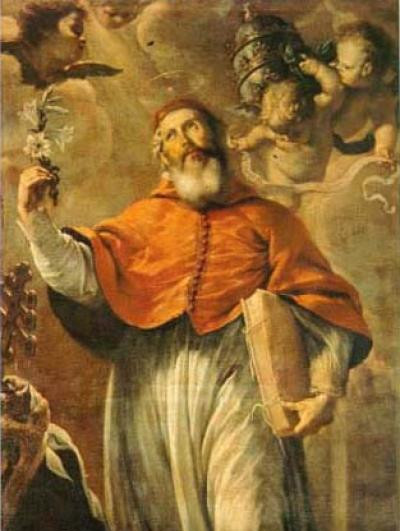
Saint of the Day December 11: St. Damasus I
St. Damasus I: The Life and Legacy of the Pope Who Promoted Liturgy and the Christian Arts
Name
St. Damasus I
Title
Pope
Birth
305 circa, Spagna
Death
December 11, 384, Rome
Recurrence
11 December
Prayer
O God, the fortress and crown of Thy saints, grant that we too, after the example of Pope St. Damasus, loving devotee of the memories of the Martyrs, may honor and imitate the glorious witnesses of our faith. Grant, O Lord, that following the example of Pope St. Damasus we may love Your word, revealed in the Bible, and meditate on it assiduously in order to know Your will and attain salvation. Through Christ our Lord. Amen.
Roman Martyrology
St. Damasus I, pope, who, in the difficulties of his times, convened many synods to defend the Nicene faith against schisms and heresies, commissioned St. Jerome to translate sacred books into Latin, and honored the tombs of martyrs by adorning them with verses.
The Saint and Mission
St. Damasus I, Pope from 366 to 384, played a crucial role in defining and expanding the mission of the Catholic Church in the late fourth century. His pontificate was marked by a deep understanding of Christian mission, which was manifested through his spiritual leadership, his passion for the liturgy and his dedication to promoting the faith.
One of St. Damasus’ most important contributions to the Christian mission was his commitment to the promotion of liturgy and sacred art. He understood the power of beauty and symbolism in the liturgy to elevate the minds and hearts of the faithful to God. Through beautifying churches and enhancing the liturgy, Damasus sought to create a sacred space that was not only a place of worship but also a source of inspiration and education for the faithful.
St. Damasus was also an ardent defender of Christian orthodoxy. During his pontificate, the Church faced numerous theological challenges, particularly the Arian heresy. His determination to counter heresies and defend the true faith was a key aspect of his mission. He promoted theological education and clergy training to ensure that the Church’s doctrine was conveyed clearly and accurately.
In addition, St. Damasus was a promoter of Scripture. His support of St. Jerome in translating the Scriptures into Latin (the Vulgate) had a lasting impact on the Church and its mission to spread the Word of God. This translation made the Scriptures more accessible to the faithful of the time, contributing significantly to the spread of Christianity.
The life and ministry of St. Damasus I remind us that the mission of the Church is accomplished through a variety of avenues: pastoral care, defense of the faith, promotion of beauty in the liturgy, and accessibility of the Scriptures. His example of leadership, dedication and vision inspires us to consider the richness and depth of Christian mission in all its dimensions.
The Saint and Mercy
St. Damasus I, Pope of the Catholic Church in the fourth century, is a historical figure who contributed significantly to defining the role of the papacy and the establishment of the Christian faith. His life and ministry offer an interesting insight into the understanding and application of mercy in the context of Church leadership.
One of the key aspects of St. Damasus’ papacy was his dedication to the pastoral care of the faithful, a key element of mercy. He dedicated himself to resolving conflicts within the Church, demonstrating a balanced and compassionate approach. His ability to mediate in situations of discord and maintain the unity of the Church reflected a deep desire to promote peace and harmony among Christians, in keeping with the spirit of mercy and reconciliation taught by Christ.
In addition, St. Damasus was known for his commitment to enhancing the Scriptures and promoting the liturgy. His work in standardizing the Latin version of the Bible, which later became known as the Vulgate, was motivated by a desire to make the Word of God accessible and understandable to the people. This effort can be seen as an act of spiritual mercy, providing the faithful with the necessary tools for a deeper understanding and practice of their faith.
St. Damasus also engaged in the embellishment of the tombs of the martyrs and the construction of basilicas, a gesture that went beyond mere artistic expression. These efforts were intended to honor the memory of the martyrs and inspire the faithful, promoting a sense of veneration and devotion. Through these acts, St. Damasus showed his understanding of mercy as a commitment to the memory and respect of the community of saints.
The life and ministry of St. Damasus I illustrate how mercy can be intrinsic to the role of a church leader. His approach to conflict resolution, his dedication to the Word of God, and his respect for the legacy of the martyrs reflect a deep commitment to living and promoting mercy as a fundamental part of the Church’s mission.
Hagiography
St. Damasus was born in Spain; but he completed his education in Rome, where he went while still very young. Because of his open intelligence and heartfelt piety, he was given holy orders at a very early age and was retained by Pope Liberius, who then ruled the Church. When the latter was later exiled to Berea by Emperor Constantius, Damasus followed him and…
